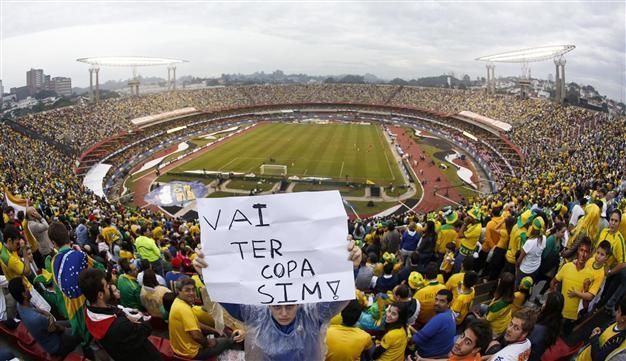World Cup ready to kick off with turbulence, thrill
Çetin Cem Yılmaz ISTANBUL

Brazilian fans cheer before the international friendly between Brazil and Serbia in the Morumbi Stadium, Sao Paulo. AFP Photo
Never in recent history has the World Cup arrived with such extremity of expectations on and off the pitch.Questions on the readiness of Brazil are hanging in the air, while security woes and worries about fresh street protests add to the growing uneasiness in the build-up to the Cup. But on the pitch, the return of the beautiful game, or “joga bonito,” to its spiritual homeland is nothing short of something truly magical worth celebrating. The question is, over the next 30 days, which one of the prospects will outshine the other.
The quadrennial tournament starts tonight in Sao Paulo, where the hosts face Croatia. Inside the stadium, 61,600 football-mad fans will be cheering for the start of the sport’s greatest showcase. The match will mark the World Cup debut of Neymar, the poster child and the great hope for for 2014 Brazil. Next to him will be Oscar, Hulk and others, battling against the likes of Luka Modric and Ivan Rakitic. What more can a football fan ask for?
However, there is fear that the beautiful game will be overshadowed by the most trouble-plagued World Cup in history. The worries are not unfounded. Today’s opening game venue in the Arena Corinthians was one of the emblems of a poor run-up to the tournament. Construction of the stadium was halted in November, when a work-related accident killed two construction workers. In March, a third worker died. In total, eight workers have died while the country was working around the clock to meet the deadline. And it's not as if the country has even managed to meet the deadline anyway: Six of the 12 World Cup venues were not ready for the initial December deadline, or even the late-May deadline. Even yesterday, reports of some workers trying their best to put final touches to the stadiums were arriving. A photo of the pitch at the Amazonia Stadium in Manaus was not promising on the turf conditions, either.
Still, FIFA, world football’s governing body and the owner of the great show, stood by Brazil. “We at FIFA, we are confident. It will be a celebration,” said President Sepp Blatter. “After the tournament kicks off, I think there will be a better mood.”
FIFA controversy
Blatter’s own mood could definitely be improved, as he came under pressure following bribery allegations regarding Qatar’s successful 2022 World Cup bid. Earlier this week, the sport’s European administrators started saying he should not be running for another term in the forthcoming elections. The current head of UEFA, European football’s governing body, Michel Platini, is expected to run in the elections, but the former French great, a player who shone on the World Cup stage in the 1980s, said he would announce his decision in September. Either way, politics will continue to steal some limelight from the World Cup.
Speaking of politics, Brazil’s turbulence has also risen from the streets. Last summer, almost simultaneously with the Gezi Park protests in Istanbul, the youth of Brazil poured onto the streets. It started out as protests over the increase of bus fares, but with the clock ticking down to the World Cup, the extravagant budget started to pay its role as well. Thousands of Brazilians started marching against the spending of $11 billion for the World Cup, when the money, as they claim, could be used for health, education, public and transport services. They chanted “Nao vai ter Copa” (“There won’t be a World Cup”) and the Brazilian state, taking lessons from being caught off-guard last summer, will deploy tens of thousands of police, soldiers and private security officers to make sure that there will be no security problems.
You feel that something is terribly wrong when you have the most football-crazy nation in the world not happy with hosting the World Cup. And make no mistake, they have a point. Four years ago, I was a journalist brimming with excitement of going to my first World Cup as a reporter. Even though I was mostly overcome with the shine of the tournament, I could not help but think how South Africa, another country with intimidating security problems and a terrible social inequality record, would be better off not hosting the Cup. Looking at the Royal Bafokeng Stadium, a 42,000-seat venue in Rustenburg’s Phokeng town, which holds a population of 35,000, I was filled with a feeling of the vanity of it. Nowadays, the effect of hosting major tournaments has started to become a hotter topic than it was in 2010, and we will continue to argue about the feel-good factor and the financial burden that comes with mega-events, especially in the wake of the World Cup, and the 2016 Olympic Games in Rio.
For now, maybe it is for the best to enjoy the football festival while it lasts, but without turning a blind eye to the streets. In Brazil, the energy and flair have always started out in the streets and turned into a global phenomenon on the football pitch. It would be foolish to ignore one of them when both the streets and the stadiums are on fire.
















